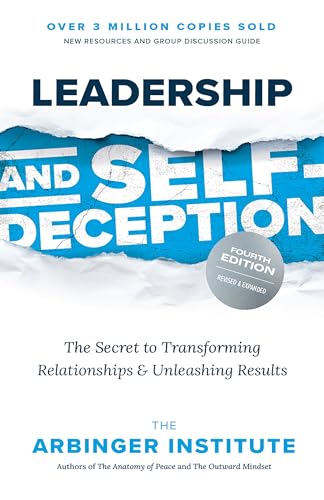
Leadership and Self-Deception, Fourth Edition: The Secret to Transforming Relationships and Unleashing Results
The Arbinger Institute
Publisher
Berrett-Koehler Publishers
Publication Date
8/27/2024
ISBN
9781523006564
Pages
176
Categories
Questions & Answers
Self-deception significantly impacts both personal and professional relationships and organizational success. In personal relationships, it leads to misunderstandings, as individuals fail to see others clearly, often viewing them as obstacles or opportunities rather than as human beings with their own needs and goals. This inward mindset fosters resentment, conflict, and a lack of empathy, damaging relationships. In the workplace, self-deception contributes to issues like poor communication, low morale, and inefficiency. It leads to a focus on self-interest, objectification of others, and a reluctance to take responsibility, which hinders collaboration and organizational growth. By recognizing and addressing self-deception, individuals and organizations can foster a more outward mindset, promoting understanding, empathy, and collective success.
An inward mindset is characterized by self-focused thinking and a distorted perception of others. Key characteristics include:
- Self-Deception: Individuals with an inward mindset often deceive themselves by ignoring their own contributions to problems and focusing on others' faults.
- Objectification: They view others as obstacles or tools to achieve their goals, rather than as human beings with their own needs and aspirations.
- Blame and Excuses: They use logic to justify their actions and find reasons to blame others, rather than taking responsibility.
- Chronic Self-Deception: This mindset can become ingrained, making it difficult to recognize and change.
- Collusion: It can lead to a cycle of mutual mistreatment between individuals or groups, as each party reinforces the other's negative view of the situation.
These characteristics contribute to self-deception by reinforcing a distorted view of reality, making it difficult for individuals to see their own flaws and the impact of their actions on others. This distorted perception can lead to poor decision-making, conflict, and a lack of accountability, ultimately hindering personal and organizational success.
Leaders can cultivate an outward mindset by recognizing and mitigating self-deception. This involves seeing others and oneself clearly, focusing on the needs and challenges of others, and fostering a culture of accountability and collaboration. Key steps include:
- Understanding Self-Deception: Acknowledge that self-deception often leads to distorted perceptions and actions that harm relationships and results.
- Developing Awareness: Be aware of one's own mindset and its impact on others, especially in moments of conflict or frustration.
- Fostering an Outward Mindset: Shift focus from self to others, showing genuine interest in their needs and challenges.
- Encouraging Open Communication: Create an environment where open dialogue is valued, allowing for honest feedback and constructive criticism.
- Promoting Accountability: Hold oneself and others accountable for their actions and outcomes, focusing on results and continuous improvement.
- Building Trust: Demonstrate integrity and reliability, which helps in building trust and fostering strong relationships.
- Seeking Feedback: Regularly ask for feedback from others to understand their perspectives and improve one's leadership style.
By adopting these practices, leaders can transform relationships and unleash organizational results.
The book "Leadership and Self-Deception" identifies several common lies that blind individuals and organizations:
- Better Than/Worse Than: Viewing oneself as superior or inferior to others, leading to entitlement or resentment.
- Justification: Using excuses or blame to rationalize self-betrayal, avoiding responsibility.
- Objectification: Treating others as tools or obstacles rather than people, fostering resistance and conflict.
- Collusion: Mutual mistreatment between individuals or groups, perpetuated by shared lies.
To recognize and overcome these lies:
- Self-Reflection: Acknowledge personal biases and the impact of self-deception.
- Outward Mindset: Focus on others' humanity and needs, rather than personal gain or blame.
- Accountability: Take responsibility for one's actions and their effects on others.
- Open Communication: Engage in honest dialogue to address misunderstandings and conflicts.
By adopting these practices, individuals and organizations can break free from the cycle of self-deception and foster healthier relationships and more effective outcomes.
Individuals and organizations can implement the principles of the book to create lasting change by:
-
Understanding Self-Deception: Recognize and acknowledge self-deception and its impact on perception and behavior. This involves introspection and being open to feedback.
-
Developing an Outward Mindset: Shift from an inward mindset focused on self to an outward mindset that prioritizes understanding and responding to others' needs and perspectives.
-
Building Trust: Foster an environment where open communication, accountability, and mutual respect are valued, reducing defensiveness and promoting collaboration.
-
Addressing Root Causes: Identify and address the underlying issues causing problems, rather than just treating symptoms.
-
Continuous Learning and Adaptation: Embrace a culture of continuous improvement, encouraging individuals to learn from their experiences and adapt their approaches as needed.
-
Training and Development: Implement training programs that focus on self-awareness, empathy, and outward mindset to develop leadership and team skills.
-
Creating a Supportive Culture: Encourage a culture that supports personal growth, recognizes individual contributions, and promotes a shared sense of purpose and responsibility.
By integrating these principles into their daily operations and practices, individuals and organizations can foster a more positive, productive, and sustainable environment.